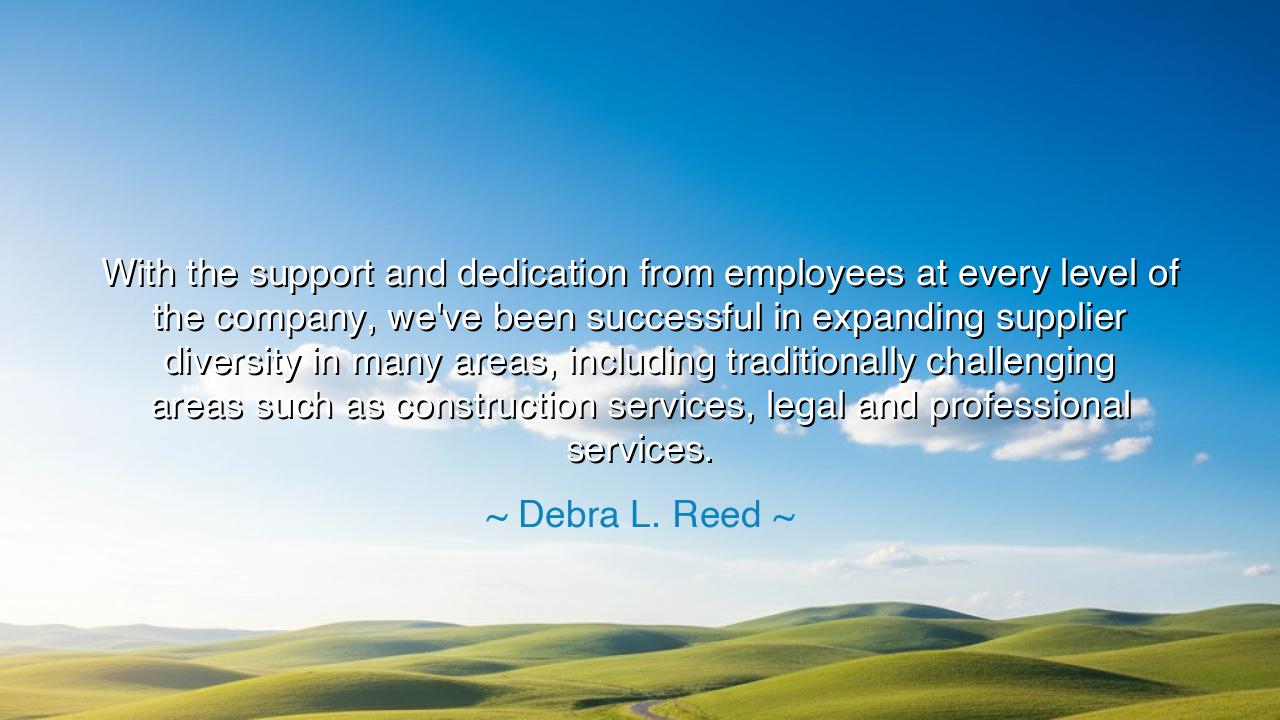
With the support and dedication from employees at every level of
With the support and dedication from employees at every level of the company, we've been successful in expanding supplier diversity in many areas, including traditionally challenging areas such as construction services, legal and professional services.






The words of Debra L. Reed, “With the support and dedication from employees at every level of the company, we’ve been successful in expanding supplier diversity in many areas, including traditionally challenging areas such as construction services, legal and professional services,” ring with the quiet triumph of a leader who understands that progress is not born of command alone, but of collective purpose. In her voice there is neither boast nor pride, but gratitude — the humble acknowledgment that unity, not hierarchy, is the true architect of transformation. Her statement is a testament to the power of collaboration, to the strength that arises when many hands and hearts labor toward a common good. It is not a tale of profit, but of principle — of how the spirit of inclusion breathes life into the walls of enterprise.
The origin of this quote lies in Reed’s stewardship as one of the first women to lead a Fortune 500 energy company — Sempra Energy. Her journey, rising from engineer to chief executive, reflects the same perseverance she celebrates in her employees. Her focus on supplier diversity is more than a business strategy; it is an act of justice in the realm of commerce, a recognition that opportunity must not flow only to the powerful, but also to the overlooked — to the small, the minority-owned, the women-led, and those who stand at the margins of traditional markets. Her words echo the wisdom of ages past: that a strong house is not built of uniform stones, but of many shapes and colors, each carrying its weight in harmony.
In her mention of “traditionally challenging areas such as construction services, legal and professional services,” Reed acknowledges that change is not easy where habit is strongest. These are the strongholds of old hierarchies, where contracts and counsel were long governed by familiarity and privilege. To break through such barriers requires not only policy, but conviction — the courage to look beyond the known and trust in the capacity of the new. It is the same courage that moved Florence Nightingale to reimagine the field of nursing in the 19th century, opening doors for women in a domain once ruled by men. It is the courage that fueled Madam C.J. Walker, who built an empire from perseverance, proving that diversity is not charity, but genius waiting for its chance. Reed’s triumph mirrors theirs — a victory not of the individual, but of the inclusive vision that uplifts all.
The heart of her message is collective responsibility. She does not speak of executives alone, but of “employees at every level,” reminding us that greatness in any organization does not spring from the summit, but from the foundation. Each worker, each contributor, becomes a builder of progress when guided by purpose. This principle is as old as the pyramids of Egypt, which were not raised by the hands of kings, but by thousands of skilled laborers united in devotion to a shared dream. In every age, it is the people — not the powerful — who carry civilization forward. Reed’s words remind us that diversity and equality cannot be commanded into existence; they must be cultivated by the daily actions of those who believe in their necessity.
Her quote also holds a subtle moral truth: that diversity is not a concession but a source of strength. In ancient Athens, the philosopher Pericles declared that the greatness of the polis came from the variety of its citizens — from craftsmen to philosophers, farmers to soldiers — each bringing a different skill to the life of the city. Likewise, Reed’s vision of supplier diversity recognizes that innovation blooms where different perspectives meet. A company that draws from many roots becomes resilient, adaptable, and wise. Diversity, in this sense, is not only ethical; it is strategic — the wellspring of both creativity and endurance.
Yet, Reed’s achievement is not simply institutional; it is deeply human. It speaks to the enduring truth that progress, whether in business or society, depends on those who see equity not as an aspiration but as a duty. In an age where competition often overshadows compassion, her words rekindle the ancient flame of service — the idea that leadership exists not for glory, but for the betterment of others. Her success in expanding inclusion into difficult sectors is proof that ideals can indeed shape reality, when pursued with persistence and faith in people’s goodness.
Let her message, then, be a teaching for all who labor and lead: that the future belongs to those who build bridges, not walls. If you would strengthen your home, your company, or your nation, look first to who is missing at the table. Give opportunity where it has long been denied; listen where silence has prevailed. For as Debra L. Reed shows, the path to greatness is not through exclusion, but through the widening of the circle — until every voice finds its echo in the halls of power. And in doing so, we fulfill not only the promise of prosperity, but the deeper promise of humanity itself.






AAdministratorAdministrator
Welcome, honored guests. Please leave a comment, we will respond soon